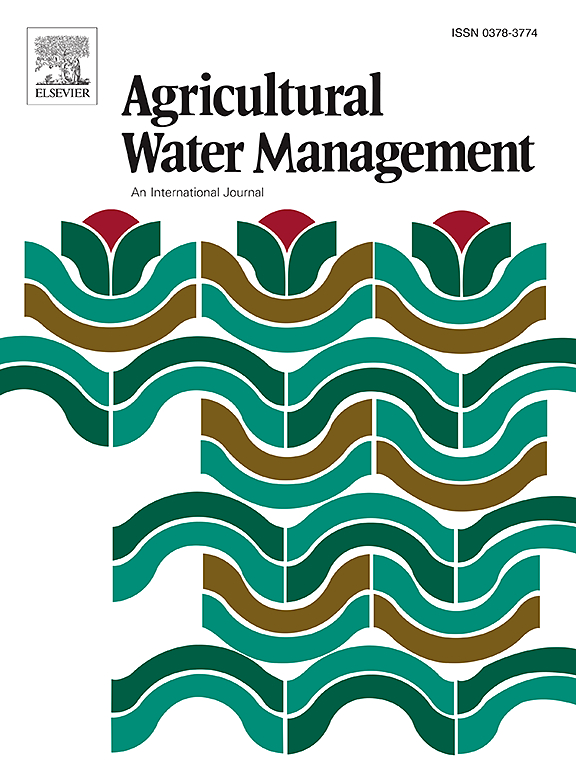滴灌通过调节小麦籽粒中谷蛋白高分子的合成来影响面团的加工质量
IF 6.5
1区 农林科学
Q1 AGRONOMY
引用次数: 0
摘要
在黄淮海平原进行田间试验,评价了滴灌在雨养(W0)和滴灌(300-W1、450-W2、600-W3、750-W4 m³ha⁻¹)5种处理下对2个高筋小麦品种ZM886、ZM998的影响。与W0(7855.87 kg ha⁻¹)相比,灌溉使粮食产量增加5.37-12.45 % (ZM886)和7.01-17.19 % (ZM998)。与W0相比,ZM886的面团稳定时间在所有灌溉水平上都有所减少(4.00-24.25 %)。ZM998在W3(4.98 %)和W4(14.29 %)下呈下降趋势,而在W1(7.00 %)和W2(3.36 %)下呈上升趋势。ZM886在W1条件下面团拉伸阻力增大(5.25 %),在W2-W4条件下面团拉伸阻力减小(2.37 ~ 36.93 %);ZM998在W1(19.89 %)和W2(4.18 %)下呈上升趋势,而在W3(15.01 %)和W4(21.99 %)下呈下降趋势。在W0下,可溶性谷蛋白(SGP)在花后26 d转化为谷蛋白大聚合物(GMP);高剂量滴灌延迟高分子量谷蛋白亚基(HMW-GS)检测。灌溉总体上降低了GMP、SGP、二硫键(- s - s -)、游离巯基(游离- sh)和HMW-GS,其中W4下降低幅度最大(如GMP:−34.00 % ZM886,−39.38 % ZM998)。相反,适度灌水(W1)使游离sh(3.25 % ZM886, 4.53 % ZM998)和- s - s -(8.54 % ZM886, 9.33 % ZM998)增加,使ZM886的GMP(2.23 %)和SGP(0.57 %)略有增加。适度灌溉(W1, 300 m³ha⁻¹,w10 - 7.55 kg - ha⁻¹)通过影响SGP解聚、HMW-GS含量和GMP调节,优化了面团的稳定时间和抗张性,实现了面团质量和产量之间的最佳平衡,实现了节水培养。本文章由计算机程序翻译,如有差异,请以英文原文为准。
Drip irrigation affects dough processing quality by regulating synthesis of glutenin macropolymers in wheat grain
Field experiments on the Huang-Huai-Hai Plain evaluated drip irrigation's effect on two high-gluten wheat varieties (ZM886, ZM998) under five treatments: rain-fed (W0) and drip irrigation (300-W1, 450-W2, 600-W3, 750-W4 m³ ha⁻¹). Compared to W0 (7855.87 kg ha⁻¹), irrigation increased grain yield by 5.37–12.45 % (ZM886) and 7.01–17.19 % (ZM998).Dough stability time decreased in ZM886 (4.00–24.25 %) across all irrigation levels versus W0. For ZM998, it declined under W3 (4.98 %) and W4 (14.29 %) but increased under W1 (7.00 %) and W2 (3.36 %). Dough tensile resistance increased in ZM886 under W1 (5.25 %) but decreased under W2-W4 (2.37–36.93 %); ZM998 saw increases under W1 (19.89 %) and W2 (4.18 %) but decreases under W3 (15.01 %) and W4 (21.99 %). Soluble glutenin protein (SGP) to glutenin macropolymer (GMP) conversion occurred at 26 days post-anthesis under W0; higher drip irrigation delayed high-molecular-weight glutenin subunit (HMW-GS) detection. Irrigation generally reduced GMP, SGP, disulfide bonds (-S-S-), free thiol groups (free -SH), and HMW-GS, with the largest reductions under W4 (e.g., GMP: −34.00 % ZM886, −39.38 % ZM998). Conversely, moderate irrigation (W1) increased free -SH (3.25 % ZM886, 4.53 % ZM998) and -S-S- (8.54 % ZM886, 9.33 % ZM998), and slightly increased GMP in ZM886 (2.23 %) and SGP in ZM998 (0.57 %).Moderate irrigation (W1, 300 m³ ha⁻¹, WUE 6.10–7.55 kg ha⁻¹ mm⁻¹) optimized dough stability time and tensile resistance by influencing SGP depolymerization, HMW-GS content, and GMP modulation, achieving the best balance between dough quality and yield for water-efficient cultivation.
求助全文
通过发布文献求助,成功后即可免费获取论文全文。
去求助
来源期刊

Agricultural Water Management
农林科学-农艺学
CiteScore
12.10
自引率
14.90%
发文量
648
审稿时长
4.9 months
期刊介绍:
Agricultural Water Management publishes papers of international significance relating to the science, economics, and policy of agricultural water management. In all cases, manuscripts must address implications and provide insight regarding agricultural water management.
 求助内容:
求助内容: 应助结果提醒方式:
应助结果提醒方式:


